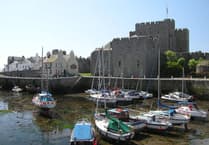What should the Isle of Man do to prepare for the future?
With debate raging about our future population numbers, the tax base and the health service, politicians have their hands full.
But perhaps they’re not the ones with all the answers. Artificial Intelligence (AI) might.
Resident Joe Hughes took to ChatGPT to see what it would come up with.
He described himself as Max Headroom Mylchreest, MHK for Axnfell.
He asked the AI programme to read the island’s census, economic plan and budget.
He told it to be bold and decisive and aim for prosperity, a good quality of life, sustainable economic growth and first-class public services.
This is what it said:
Housing:
• 500 new social housing units with a budget of £50 million.
• Tax on unoccupied properties at a rate of 1% of the property’s value per year
• 6% stamp duty
Personal tax:
• 23% top-rate for an income of more than £200,000
• 12% basic rate
• 22% higher rate
Corporate tax:
• 5% for more than £500,000
Its general thoughts:
• The Isle of Man Government has a deficit and needs to find ways to generate more revenue.
• Tax changes to grow revenue
• Invest in social housing (the Isle of Man’s percentage of social housing is 11.5, much lower than many developed countries)
• Consider rent controls
• Brownfield focus
• £10m in vocational training/apprenticeships
• £10-15 million in additional funding to support investment in healthcare, including the recruitment of additional staff
• £5-10m to support families with subsidised/free childcare or incentives for more children
• Introduce a ‘use it or lose it’ policy for developers who hold onto land
• Rent control policy to ensure that rental prices remain affordable for lower-income residents.
• Conduct a review of the current tax incentives available to companies, such as the tax cap
• Invest in sustainable tourism initiatives to attract more visitors to the island, with a budget of £5 million.
• Develop new tourism products and experiences, such as adventure sports and cultural events, with a budget of £5 million
• Increase minimum wage
• Investigate universal basic income
• Invest in early intervention and prevention programs for mental health
• Increase funding for addiction services
• Implement a sugar tax on sugary drinks
• Lump sum payment or income tax credits for returning graduates after two years work (like Taiwan). £38,000.
Its summary when reviewing economic plan:
Without changes to policy, the Isle of Man may continue to face demographic challenges such as an ageing population, an inadequate healthcare system, and a shortage of skilled workers.
The economy may also struggle to diversify and grow leading to potential revenue shortfalls and budget deficits.
Additionally, the lack of affordable housing and high cost of living may make it difficult for people to live and work on the island, leading to a decline in population.
The success of any policy changes will depend on various factors such as the willingness of the government to implement them, the level of public support and factors such as global economic conditions. It will require significant effort and resources to make these changes happen.
•£400m bond (climate)
•£100m renewable energy
•Offshore/solar/hydro/storage
•£50m green transportation, electric vehicles and self-driving
•£50m green buildings
•£50m green incentives (trees, living roofs etc)
•£50m waste reduction/recycling
•£50m R&D (storage/capture)
•£50m education
Mr Hughes, who posted the findings on Twitter, said: ‘The implementation of strategic initiatives such as investment in infrastructure, renewable energy, healthcare, education, social housing, and the stimulation of innovative business ideas could contribute to the growth and prosperity of the island.
‘By improving infrastructure, investing in education and healthcare, and creating job opportunities, the Isle of Man can become an attractive place to live and work, which can in turn lead to population growth over time.
‘Of course, there are challenges that need to be addressed, such as an ageing population and a shortage of skilled workers, but I believe that with a strategic approach and a willingness to adapt, the Isle of Man can overcome these obstacles and thrive.’

-and-Chairman-of-the-Isle-of-Man-Magistrates-Association-Davi.jpeg?width=209&height=140&crop=209:145,smart&quality=75)
-(2).jpeg?width=209&height=140&crop=209:145,smart&quality=75)


Comments
This article has no comments yet. Be the first to leave a comment.